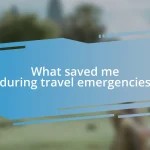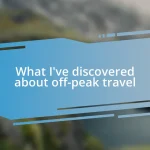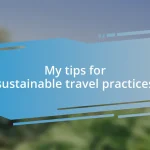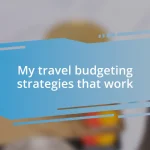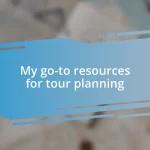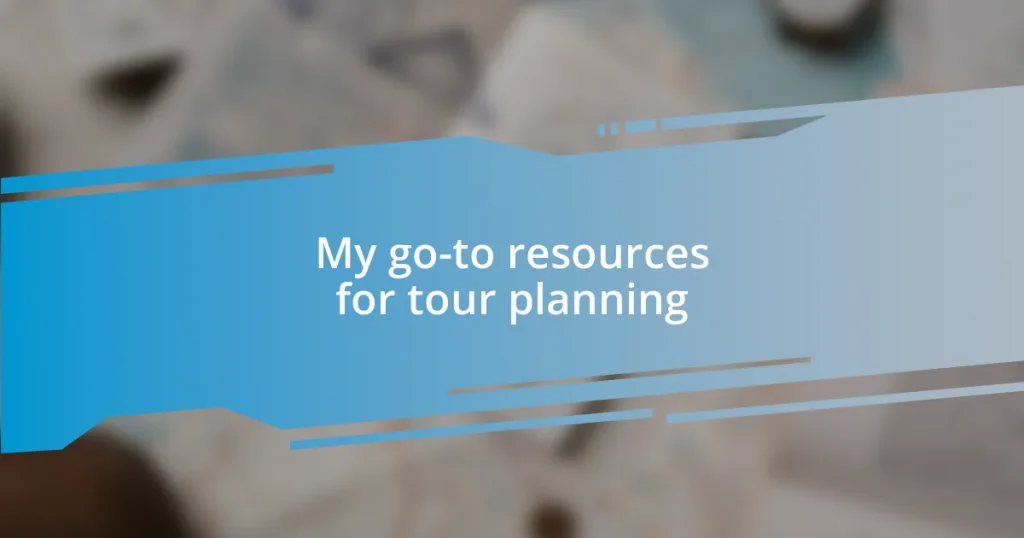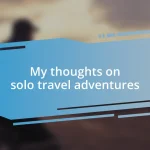Key takeaways:
- Understanding your audience is crucial for creating a tailored itinerary that considers everyone’s interests in tour planning.
- Budgeting effectively balances costs with memorable experiences, ensuring a stress-free trip.
- Utilizing apps for itinerary management and travel forums for advice can significantly enhance travel planning and experience.

Key considerations for tour planning
When planning a tour, one of the key considerations is understanding your audience. I remember when I took a group of friends to a destination I loved; their tastes were completely different from mine. This experience taught me the importance of tailoring the itinerary to suit the interests of everyone involved. Are you considering the preferences of your travel companions?
Budgeting is another critical aspect that can make or break your tour planning. I once went overboard on a lavish dining experience in Paris, only to realize later that it ate into our budget for other activities. Have you thought about how to balance cost with experience? It’s essential to create a budget that allows for both memorable experiences and practical needs to ensure everyone enjoys the trip without financial stress.
Time management is equally vital. I vividly recall a trip where we tried to squeeze too many attractions into one day. It left us exhausted and missing the charm of the places we visited. Have you considered how pacing might affect your overall experience? Carving out time for relaxation and spontaneous exploration can often lead to the most unforgettable moments.

Essential websites for travel research
When diving into the realm of travel research, I always start with websites like TripAdvisor. They provide a treasure trove of reviews and photos from other travelers. I can’t tell you how many times I’ve changed my plans after reading about someone’s experience at a restaurant or attraction; their insights often feel more relatable than professional guides.
Another great resource is Google Flights. I remember the feeling of excitement when I stumbled upon their “Explore Destinations” feature. It helped me visualize potential trips within my budget, transforming a vague idea into a concrete plan. The interactive map displays flight prices, making it not just a practical tool but also fun to use.
Lastly, I can’t underscore the value of Pinterest in travel planning. This site may seem like it’s just for crafts and recipes, but I’ve found countless travel boards filled with itineraries and destination inspiration. I often find myself pinning ideas late at night, dreaming of future adventures while sipping on my favorite tea.
| Website | Key Features |
|---|---|
| TripAdvisor | User reviews, photos, and Q&A |
| Google Flights | Flight price comparison, destination exploration |
| Travel inspiration boards, itineraries |

Best apps for itinerary management
When it comes to managing itineraries, I’ve found that the right apps can truly be game-changers. For example, I once mismanaged my itinerary during a trip, which led to a series of last-minute scrambles. After that experience, I began relying on specific apps that keep everything organized and clear. They not only help track activities and reservations but also send reminders when it’s time to move from one adventure to the next.
Here’s a list of the best apps I recommend for itinerary management:
- TripIt: Automatically imports travel details from your email, consolidating your itinerary in one place.
- Roadtrippers: Perfect for planning scenic drives, it maps your route and curates attractions along the way.
- Google Maps: I love using the “Your Places” feature to save all my planned stops in a single list, making navigation effortless.
- Sygic Travel: This app offers customizable itineraries with offline maps, which is a lifesaver when you’re exploring areas without cellular service.
- Kayak Trip Huddle: A great tool for group trips, it allows friends to propose and vote on activities, streamlining the decision-making process.
Using these apps has saved me time and reduced stress significantly. I remember a particular trip to Italy where I utilized TripIt to keep all my reservations organized. I finally felt at ease, knowing I wouldn’t miss any train connections or guided tours. It’s incredible how technology can transform the travel experience into something much more enjoyable!

Top travel forums for advice
When I’m seeking travel advice, I often turn to travel forums like Lonely Planet’s Thorn Tree. I love how it brings together a community of travelers from all around the globe. I once posted a question there about hiking in New Zealand, and not only did I get responses from seasoned hikers, but I also discovered hidden trails I wouldn’t have found otherwise. It’s like tapping into a treasure chest of shared experiences!
Another excellent forum is Reddit, particularly the r/travel subreddit. I’ve found it to be a fantastic place for candid discussions and tips. There was this one time when I read about a traveler who mentioned a quirky café in Paris that serves cupcakes with unexpected flavors. Intrigued, I made it my mission to find this place, and it truly added a delightful twist to my trip. Doesn’t it feel good to connect with fellow adventurers who share insights that can lead to those memorable, off-the-beaten-path experiences?
Lastly, I often browse Fodor’s Travel forums for their well-rounded discussions and expert advice. I recall coming across a thread about navigating local public transport in Tokyo. The practical tips shared by others made my travels seamless and far less daunting than I anticipated. How amazing is it to leverage the knowledge of a community to make our journeys more enjoyable? Travel forums are not just about receiving advice; they foster a sense of camaraderie among those who are passionate about exploring the world.

Popular travel blogs for inspiration
When I’m in need of travel inspiration, I turn to popular travel blogs that never fail to ignite my wanderlust. For example, The Blonde Abroad has a captivating narrative style that makes you feel as if you’re exploring the world alongside the author. I remember scrolling through her stunning photos and travel guides while planning a solo trip to Thailand. It was like she was right there with me, sharing practical tips and encouraging me to embrace the adventure.
Another blog I love is *Nomadic Matt*, which focuses on budget travel. Matt’s honest stories resonate with me; I once found his post about traveling through Southeast Asia on a shoestring budget that completely shifted my perspective. It hit home when he shared the joy of connecting with locals and how that enriched his travels far beyond extravagant spending. Have you ever considered how much deeper a travel experience can be when you engage with the culture instead of just sightseeing? His insights opened my eyes to the beauty of immersive travel.
Then there’s *Adventurous Kate*, who reminds me that sometimes the best experiences arise from spontaneity. I recall a blog post about her unplanned detour in Iceland where she discovered hidden hot springs. Reading her thrilling recount made me excited about the possibility of stumbling upon my own unforgettable moments. Isn’t it fascinating how stepping off the beaten path can lead to memories that stay with us long after the trip is over? These blogs not only inspire me; they push me to embrace the unpredictable nature of travel.
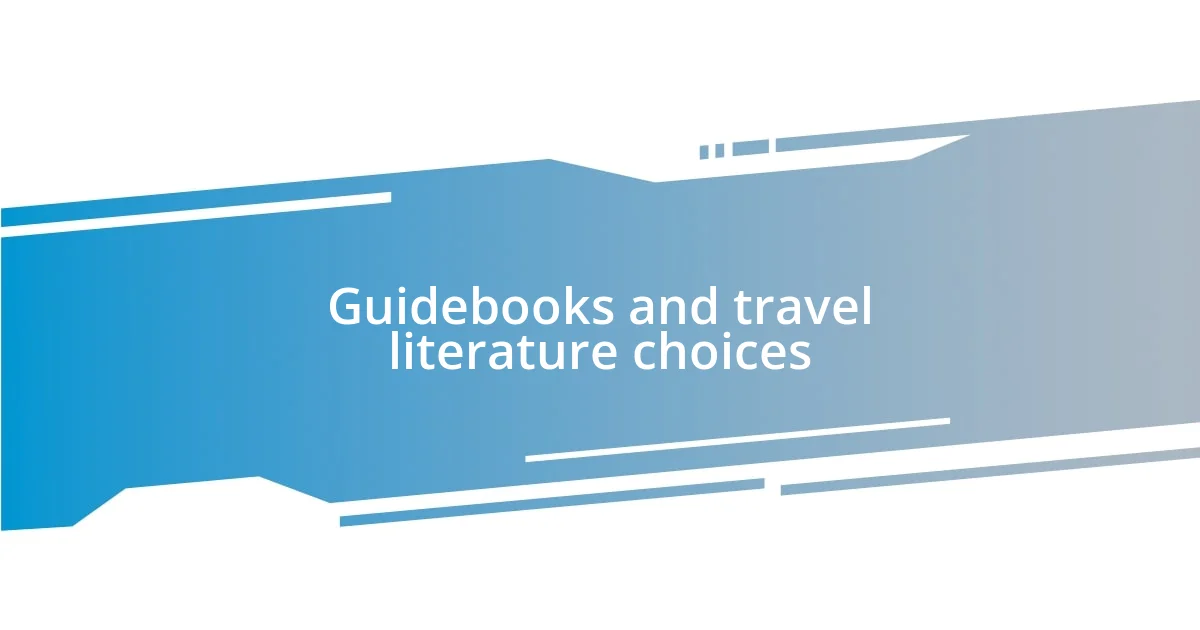
Guidebooks and travel literature choices
When it comes to guidebooks, I’ve always gravitated towards Lonely Planet. Their comprehensive coverage and practical tips feel like having a knowledgeable friend by my side while I’m exploring a new city. I recall flipping through the pages during a trip to Italy, and I stumbled upon a quaint little restaurant in Florence known for its homemade pasta. The meal was unforgettable, and I often think back on that spontaneous dinner that became a highlight of my journey. Don’t you love when a guidebook leads you to such delightful surprises?
For travel literature, I find myself reaching for something a bit more narrative-driven, like Bill Bryson’s A Walk in the Woods. His witty observations on the Appalachian Trail had me laughing out loud and feeling a connection to the outdoors, even from my armchair. While planning my hiking trip, his humorous anecdotes not only entertained me but ignited a deeper appreciation for the natural world. Have you ever read something that made you eager to lace up your boots and hit the trails? Bryson’s insights inspire me to approach hiking with a sense of wonder.
Lastly, I can’t help but mention Rick Steves’ guidebooks. They have this unique ability to simplify complex navigation while enriching my understanding of a destination’s cultural nuances. On a rainy day in Amsterdam, I followed his walking tour that guided me through the city’s history, and I remember pausing at a small museum I would have overlooked otherwise. The experience was so enriching, and it made me wonder: how much do we often miss out on when we stick strictly to tourist hotspots? Rick’s books remind me that every corner holds a story waiting to be uncovered.





